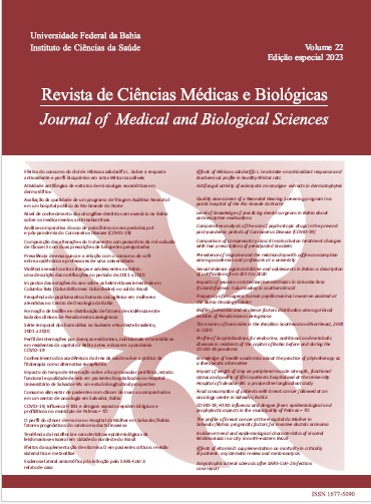Conhecimento dos acadêmicos da área da saúde sobre a prática da fitoterapia como alternativa terapêutica
DOI:
https://doi.org/10.9771/cmbio.v22i4.52192Keywords:
Estudantes, Fitoterapia, Plantas medicinaisAbstract
Introduction: phytotherapy contemplates a knowledge that has permeated Brazilian families in health care for decades. To ensure safe therapy, the importance of training academics in the health area on the subject is observed. Objective: analyze the knowledge of health practices on phytotherapy as a therapeutic alternative. Methodology: trata-se de uma pesquisa de caráter quantitativo com delineamento transversal, não experimental e a coleta de dados realizada utilizando-se um questionário contendo perguntas sobre a fitoterapia. Results: responded to marriage, 310 years of age from courses in Nursing, Medicine, Nutrition, Psychology, Dentistry and Pharmacy, among these, age of sex (84, female age 21 and single) (48.7%), single (72 .6%) and with a family income between 1 and 2-minimum (27.7%). A total of 51.6% said they knew about the phytotherapeutic terms and medicinal plants and did not know the risks of inappropriate use, 80.3% said they did not know how to provide guidance on the correct use, risks and benefits, 66.1% knew how form of use, 58.4% do not know the part of the plant to be used and 64.5% do not know how to cite medicines from plants. Most of those who are important (98%) understand that the health professional is aware of this practice, and most are interested in learning about the topic (78%). Conclusion: from the data presented, it is noted that there are flaws in the training of academics, and the importance of including the discipline on phytotherapy in the curriculum of courses in the health area is highlighted.
Downloads
Downloads
Published
How to Cite
Issue
Section
License
Copyright (c) 2024 Journal of Medical and Biological Sciences

This work is licensed under a Creative Commons Attribution 4.0 International License.
The Journal of Medical and Biological Sciences reserves all copyrights of published works, including translations, allowing, however, their subsequent reproduction as transcription, with proper citation of source, through the Creative Commons license. The periodical has free and free access.


